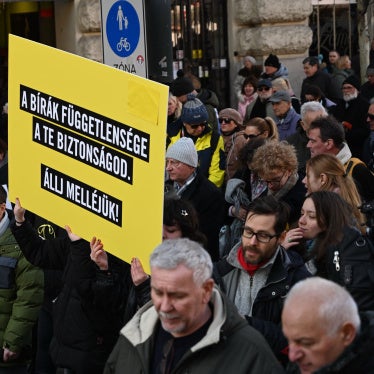The European Union (EU) must react strongly to the harsh sentencing of 10 pro-democracy activists in Syria, Human Rights Watch said today.
Syria´s state security court found the activists guilty of “attempting to change the constitution by illegal means,” “spreading false information,” and other vaguely worded political charges and sentenced them to two to 10 years in prison. On August 28, the court handed down judgments to the last three defendants, sentencing engineer Fawaz Tello to five years in prison, physician Kamal Labwani to three years, and teacher Hassan Saadun to two years.
“The European Union does a lot of business with Syria, and it has a responsibility to respond to a human rights crisis of this magnitude,” said Lotte Leicht, Brussels director of Human Rights Watch. “The criminal prosecution of these activists was a blatant violation of their right to freedom of expression. The European Union, and especially France among the member states, should raise their cases with Syrian authorities and campaign for their release.”
The European Union is Syria´s main trading partner, with some 55 percent of Syria´s exports going to EU member states.
The roundup of the activists began in August 2001, with the arrest of independent member of parliament Mamoun al-Homsi. Nine others were arrested in September 2001, including outspoken parliamentarian Riad al-Seif and 72-year old lawyer Riad al-Turk, a veteran political activist who was imprisoned without charge and held incommunicado from 1981 to 1998. Homsi and Seif were tried in the Damascus criminal court and sentenced earlier this year to five years in prison. Turk was prosecuted in the state security court and sentenced to two and a half years in June.
The remaining seven defendants—all of whom were active in the country´s popular independent civic forums and human rights organizations—were tried in the security court. Lawyer Habib Issa received a five-year sentence on August 19, economist and university professor Aref Dalila was sentenced to 10 years, and physician Dr. Walid al-Bunni to five years, on July 31. Businessman Habib Saleh was sentenced to three years in June.
The security court´s procedures do not meet international fair-trial standards and its decisions cannot be appealed. “You´re a doctor, so learn to go to your clinic and not interfere in politics,” one of the court´s judges told Kamal Labwani, according to the BBC.
Syria and the European Union have close relations. Syria has received grants from the European Commission and loans from European Investment Bank to support economic infrastructure projects. According to the Delegation of the European Commission in Syria, seven Financing Agreements for specific projects have been concluded since 2000. The European Union has also been negotiating an Association Agreement with Syria since May 1998, with the most recent session in Damascus in June 2002.
The Association Agreements stipulate that relations between the parties “shall be based on respect of democratic principles and fundamental human rights as set out in the Universal Declaration on Human Rights, which guides their internal and international policy and constitutes an essential element of [the agreements].”
“The European Union has contacts and leverage with the Syrian government on many levels,” said Leicht. “It should not ignore the harsh sentences of these political reformers and human rights activists.”
Leicht said the European Union, at all levels, should be pressing for the prisoners´ unconditional release, and the release of others imprisoned in Syria solely for expression of their opinions and peaceful civic or political activity.







